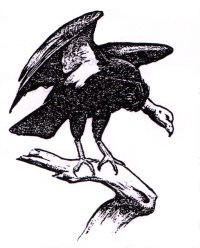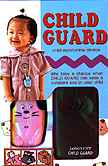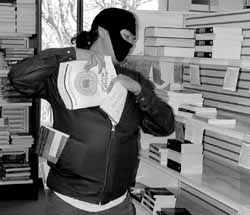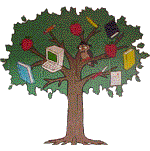|
 The
VigilanceVoice The
VigilanceVoice

VigilanceVoice.com
Thursday--July
18, 2002—Ground Zero Plus
309
by
Cliff McKenzie
Editor, New York City Combat Correspondent News
GROUND ZERO, New York City, July 18--The pillars of society are
weakening, one page at a time. It's the result of the bookstore Terrorists.
They are stealing Vigilance from the children, abducting their knowledge
and wisdom, molesting their innocence.
Each morning I review the news from around the
world, the nation, and locally, here, in my present home town of Manhattan, New
York City.
Like the eagle pictured above I keep a Vigilant eye
open for
signs of erosion, structural flaws, hairline cracks, and potential bombs
strapped to pilings that support our nation's strength as "leader of the
principles of freedom." Freedom in my book isn't personal
freedom, it's the freedom that belongs to the children, and their
children's children. Any other freedom is selfish,
self-centered.
 |
Unfortunately, the news I scan each morning is a
composite of microscopic examinations of human ills, making the media
proctologists examining the bowels of human character defects.
Scanning headlines makes one want to retreat from the human race,
hide in a cave, disenfranchise oneself from all around him or her.
A child reading them would quickly assume the world is perched on a
vulture's roost, waiting to pounce and feed on them and their
children and their children's children.
 |
The sad story about the young girl from
Stanton, California who was abducted, raped and murdered did not have a
counterbalance story about a stranger rushing into the street and saving a
child from being hit by a car.
The article about the suicide bombing in
Israel didn't talk about the Palestinian mother who teaches her children
respect for others, and turns her children's attention away from hatred to love for
their "enemies."
Battles between Protestants and
Catholics in Ireland don't promote in the same breath the struggle of the
average citizen to end the dispute, so similar in ways to what is
happening in Palestine.
The dip in the stock market doesn't
remind people how much wealth the public made when the bubble was rising, but instead
frightens them away from remembering they chose to ride the roller coaster
of finance.
Then, buried in a little corner, there
is the story
about "Bookstore Terrorism."
 |
It seems amidst all the Enron,
WorldCom, Martha Stewart, Imclone, Osama bin Laden, and Palestine-Israel Terrorism,
percolates an insidious effort by humans to steal books.
New York Times reporter Martin
Arnold calls his July 18 story the "The Best Stealer List."
His article includes a compendium of books most
likely to be stolen from bookstores across the country, plus, demographics
of the most likely "book Terrorists."
 |
On the East and West Coasts,
Arnold reports the most stolen books are from the "Beat Generation," or,
in the lingo of booksellers, "Beat Books." Beat poets and
writers such as Kerouac, Bukowski, Burroughs, Ginsberg, Hunke, Kafka and
Abbie Hoffman are what Arnold calls the "hot steals."
Book sellers hide them behind the
counter and keep a wary eye on whomever asks to browse one.
Next in line are expensive art books,
usually stolen and then resold to street vendors or other book stores.
There apparently is even a conspiracy, a Rico-type criminal band, who sends
thieves out to steal books to stock their own stores. Some art
books range in the hundreds of dollars.
 |
|
Strand Book Store |
Status seems to have no collar on restraining crime.
Strand Bookstore owner Fred Bass reports his Manhattan store--"Mile Of
Books"--is being Terrorized by eggheads. Leading his theft
list are books on higher mathematics, philosophy, and, get this, scholarly
religious works. And, surprise, surprise, the largest and most
popular book stolen is the Bible.
Bookstore owners agree across the country
the biggest rise in theft is from the professional sector--men and women
more than capable of purchasing a book-- who choose to steal rather than
buy.
The author of the Times article didn't try
to examine the psychometrics of why people steal, except to suggest that
some people feel books belong to everyone, and therefore no one and that
they are fair game.
I thought his conclusion was a bit thin.
If one looks at the principle of abducting
a book, and stretches its nature to its extreme, book stealing becomes a distant relative of the
horrible person who kidnapped the little girl from her front yard, raped
and killed her. Historically, little crimes lead to bigger
ones.
 |
One who steals things gets a "rush,"
a surge of excitement, a shot of adrenalin that courses through the body,
setting in motion primal chemicals that feed the "Beast Within."
Criminals thrive on such a rush.
A Book Terrorist knows when he or she
enters a book store what he or she is going to do. Such
persons steal with premeditation. They move about in a manner
to be undetected, and slip the book into some pouch or pocket, then
nonchalantly stroll about, heart racing, hands sweating, trying to be
cool. They may even carry a disabler to nullify the buzzer or alarm
at the exit. Presumptuously, they move out of the store, the rush of "being
caught" whirring in their head, ready to make some excuse if caught--an
"Oh, I forgot," to make them appear absent minded instead of criminal.
Then they rush home and put their treasure up on the bookshelf, proud they
have "beaten the system," justifying their behavior in a perverse
twist of the rules of common respect and decency so their act fits their
pathology of selfishness rather than fairness..
The guy who abducted the little girl wasn't
much different. He was operating on the same principles of
"abduction" as "Book Terrorist," but instead of putting the "book" on the shelf, he defaced it
and then ripped it into pieces.
A book thief opens
the door to more perverse degrees of Terrorism. If the idea
behind stealing is the "rush" and the "excitement," then who can say the
thirst for deeper rushes, for more bizarre "abductions" might not grow
like a cancer, leading one to the extreme of all human abduction--the
kidnapping and brutalization of a child.
Ultimately, both profiles are about selfish power.
The book thief flaunts his or her power to lord over the store, over the
law, over society's norms of fairness. Most thieves celebrate
their crime, exclaiming how they ripped off someone, yelling in the air,
patting themselves on the back, even chortling to themselves and then
plotting the next abduction.

|
They don't consider the consequences.
Or, dwell on the child who may have watched them steal the book, and
because they are an adult, a role model, the child legitimized the
action, and says: "When I grow up, I want to steal a book just like that
big person
did."
Book Terrorists don't think about the economic
impact of their theft, how the losses increase the overall price of books,
perhaps denying a child the ability to have one bought for him.
Book Terrorists are not unlike the Terrorists who
slammed into the World Trade Center--they justify their acts against their
own moral standards, not against the broader base of what's right for the
children, and their children's children's children and all children.
The morality of Vigilance gives way to the need for self-satisfaction, for
ego-gratification.
While a Book Terrorist might be one of the
first to admonish the kidnapper of a young child, and rail on vociferously
about the heinous immorality of such an act, the distance between the two
"crimes against children" is not that far.
Books are the children of society.
They are the seeds of knowledge; little children stacked in rows, dressed
in covers and pulp, containing the fragmented knowledge and wisdom of the world. Archeologists
seek to find the "books," the "tablets," the "hieroglyphics" of ancient time to glean the history
of the past so it might be used to predict the future. Tomb
robbers steal from the children, erase the history of their great great
ancestors. Book stealers are Tomb Robbers.
From the first writings in the caves of
Lascaux, France, to
the Dead Sea Scrolls, words have been the parents' gift to the children's children's children
of all time. Their words, drawings, and mirror to the past, form the backbone of human culture,
its spine, expressing the pathos and ethos of a world full of hope or
dismay, brimming with Courage,
Conviction and Right Action, or, roiling with Fear, Intimidation and
Complacency.
 |
Book thieves abduct these gifts of
timeless generations; they
steal the "children of
history." They steal the seeds of knowledge, ripping them from
the womb of knowledge as a mad abortionist might, depriving the innocent of their
rightful ownership, earned by paying for the book, or having it given as a
gift from a loved one who purchased it. One who steals never
owns. They are propertyless, even though they may have
possession, such possession is fraudulent.
Worse, some book theives justify their actions because
books are "just words." But books are more than just "words."
They are the human visions to the future, such as H.G. Wells so
deftly penned.
I don't take book thieves lightly.
As a Sentinel of Vigilance, I see the book
as the window to the world, designed to feed a child's hungry mind, a meal for
her or him to consume in the evolution of the self. Stealing
one starves a child.
A book snatcher is
ultimately a child snatcher. He or she steals wisdom and knowledge
from the nubile mind, and his or theft sets into motion the Terrorist
selfishness of the "thrill of abduction," the
joy of "power over others." While it may be innocent
at first, it can expand into its extremes.
Vigilance is all about protecting not
Terrorizing the children. It is about seeing the future as a result of one's
actions. One who steals books and looks down the pipe will see
the long-range effect on the children's children's children.
He or she will see that stealing sets into motion the idea of "abduction,"
of robbing youths of their right to learn and explore at reasonable
cost.
Looking down the pipe, one wonders if
the man who abducted the little girl in California once stole books.
Go To July 17--The Spine Of Vigilance
©2001
- 2004, VigilanceVoice.com, All rights reserved - a ((HYYPE))
design
|
|











